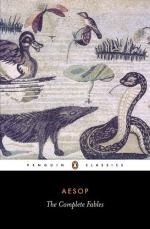Utility is most men’s test of worth.
THE JACKDAW AND THE PIGEONS
A Jackdaw, watching some Pigeons in a farmyard, was filled with envy when he saw how well they were fed, and determined to disguise himself as one of them, in order to secure a share of the good things they enjoyed. So he painted himself white from head to foot and joined the flock; and, so long as he was silent, they never suspected that he was not a pigeon like themselves. But one day he was unwise enough to start chattering, when they at once saw through his disguise and pecked him so unmercifully that he was glad to escape and join his own kind again. But the other jackdaws did not recognise him in his white dress, and would not let him feed with them, but drove him away: and so he became a homeless wanderer for his pains.
JUPITER AND THE TORTOISE
Jupiter was about to marry a wife, and determined to celebrate the event by inviting all the animals to a banquet. They all came except the Tortoise, who did not put in an appearance, much to Jupiter’s surprise. So when he next saw the Tortoise he asked him why he had not been at the banquet. “I don’t care for going out,” said the Tortoise; “there’s no place like home.” Jupiter was so much annoyed by this reply that he decreed that from that time forth the Tortoise should carry his house upon his back, and never be able to get away from home even if he wished to.
THE DOG IN THE MANGER
A Dog was lying in a Manger on the hay which had been put there for the cattle, and when they came and tried to eat, he growled and snapped at them and wouldn’t let them get at their food. “What a selfish beast,” said one of them to his companions; “he can’t eat himself and yet he won’t let those eat who can.”
THE TWO BAGS
Every man carries Two Bags about with him, one in front and one behind, and both are packed full of faults. The Bag in front contains his neighbours’ faults, the one behind his own. Hence it is that men do not see their own faults, but never fail to see those of others.
THE OXEN AND THE AXLETREES
A pair of Oxen were drawing a heavily loaded waggon along the highway, and, as they tugged and strained at the yoke, the Axletrees creaked and groaned terribly. This was too much for the Oxen, who turned round indignantly and said, “Hullo, you there! Why do you make such a noise when we do all the work?”
They complain most who suffer least.
THE BOY AND THE FILBERTS
A Boy put his hand into a jar of Filberts, and grasped as many as his fist could possibly hold. But when he tried to pull it out again, he found he couldn’t do so, for the neck of the jar was too small to allow of the passage of so large a handful. Unwilling to lose his nuts but unable to withdraw his hand, he burst into tears. A bystander, who saw where the trouble lay, said to him, “Come, my boy, don’t be so greedy: be content with half the amount, and you’ll be able to get your hand out without difficulty.”




